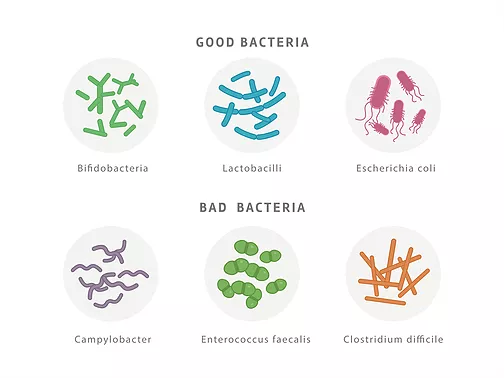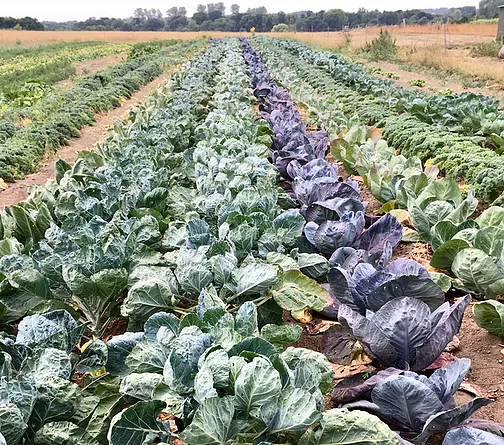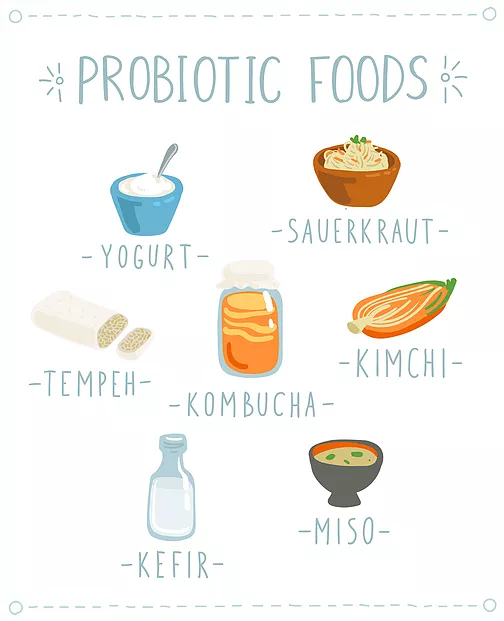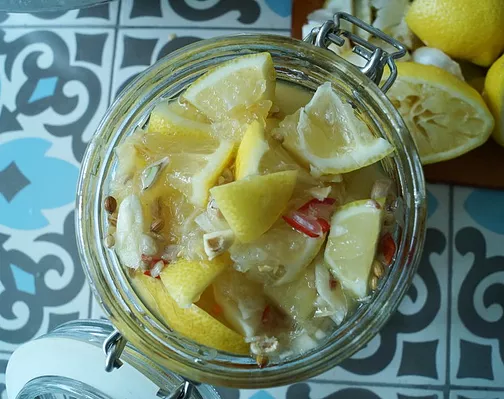80% of your immune system sits in your your GUT. And therefore it is said that if your GUT is healthy, you are healthy.
If the Gut hosts the largest part of our immune system, it’s army are the probiotics, AKA the good gut bacteria – the good guys. Our modern lifestyle that is rich in sugar, alcohol, refined carbohydrates, antibiotics, other drugs, chlorinated and fluoridated water, and loads of emotional stress impacts our levels of probiotics. Most often than not, chronically ill people, overweight people, people suffering from mood disorders like depression, people suffering from autoimmune disorders like thyroid disease, all have low probiotic levels in their GUT.

What are probiotics?
Probiotics are types of live bacteria that are found in the lining of your digestive tract and support your body’s ability to absorb nutrients and fight infection.
What damages my probiotics?
– Antibiotics found in non-organic meat, dairy and prescription antibiotics
– High sugar and high refined carbohydrate diets (white rice, pasta and white bread)
– Tap water
– Emotional stress
– Chemicals: pesticides, herbicides, heavy metals found in our food and water supply
– Genetically engineered foods
– GMO’s
– Medication
Which conditions would benefit the most from a balanced GUT?
– Anyone who is dealing with a digestive disorder like IBS, Crohn’s, Colitis but also people who suffer from chronic constipation and bloating.
– People who suffer from weak immune systems (from recurrent colds and flu’s to autoimmune diseases and skin disorders)
– Those suffering from recurrent UTI’s & Candida
– Children suffering from eczema & asthma
– Those trying to loose weight
So what types of probiotics are there?
Probiotics are divided into:
1. Probiotic foods
2. Probiotic supplements

Probiotic foods:
According to neurologist Dr. Natasha Campbell-McBride
“Every traditional culture, when you look at their traditional diet, they ferment their foods. They fermented everything. You can ferment dairy, grains, beans, vegetables, fruits, meats, and fish. Everything can be fermented, and there were fermented beverages in every culture. When the cabbages were ripe in September, you made it a fermented cabbage.
Perhaps for a month or two, you were eating fresh cabbage, but then for the rest of the year, 10 months of the year, you ate your cabbage in a fermented form. Quite a large percent of all the foods that people consume on a daily basis were fermented. And with every mouthful of these fermented foods you consume trillions of beneficial bacteria”.
Fermented foods give you way more units of probiotics and strains of probiotics than a supplement ever will. When Dr. McBride tested the fermented vegetables, she found that her vegetables had trillions of probiotic units and over 30 strains, which means her one serving of fermented vegetables was equal to an entire bottle of supplement probiotics.
This process of fermentation does even more than preserve your food — it also makes the nutrients in the food more bio-available. According to Dr. McBride, the amount of bio-available vitamin C in sauerkraut is 20 times higher than in fresh cabbage!

Probiotic foods include:
*Milk kefir, Water Kefir & Coconut kefir
*Kombucha
*Fermented vegetables like lemons, sauerkraut and kimchi
*Natto and Miso
*Kvass
*Coconut yogurt
According to a study performed by the European Journal of Clinical Nutrition. “Twelve weeks of consuming a fermented milk product containing the Lactobacillus strain was associated with a 4.6 per cent reduction in abdominal fat…”.
Probiotic supplements:
There are a few things to consider when buying a probiotic supplement:
There are many different types of probiotic strains, each strain has
a specific job (some help you digest your food better, some support the immune system or help balance your hormones) and it’s best to research which strain will benefit your body most.
When buying a probiotic supplement you want to try get as many strains as possible – “Multi – Strain”. Check the label. You should be getting between 10-30 different strains. On this note, milk kefir alone contains 50 different strains of probiotics in it.
Probiotics are really sensitive to heat and often die when exposed to light or heat. Make sure you are buying a reputable brand that was kept in cool conditions and that you are getting what you pay for.
Make sure that you are getting a supplement that has very high CFU’s (colony forming units) of between 15 billion to 100 billion.
When you eat probiotic foods your whole digestive system enjoys the probiotics, where as, when you take the supplement it usually gets digested in the stomach and therefore does not have the same effect as the probiotics foods do. Many people who have high acidity in their stomach destroy the probiotic supplement very early on in the digestive process and that results in you not enjoying the benefits of the probiotic supplement. Therefore look for the following strains: bacillus coagulans, saccharomyces boulardii, bacillus subtilis, lactobacillus rhamnosus, and other cultures or formulas that ensure probiotics make it to the gut and are able to colonize.
What happens if I take too many probiotics?
No need to panic, you might have loose stool but your body will normalise this. Just drink extra water.
My top tips for balancing your GUT and ensuring you have enough good guys:
-Avoid the foods and substances that “kill” the good gut bacteria and stick to a whole foods diet rich in fibre.
-Get a water filter
-Try to make probiotic rich foods at home and consume 1-2 servings a day
-If you have just taken a antibiotic, supplement with additional probiotics.
Preserved Lemons Recipe:
I love lemons in general, they add the best flavour to any food but when you preserve them the flavour just intensifies and it is an exquisite taste that will blow your taste buds away. Brilliant to add to your salads, sandwiches (perfect with smoked salmon) and any dish that you wish to have a sophisticated lemony flavour.

Recipe:
9 lemons washed
7 cloves of garlic peeled
6 small red chillies- de-seeded
4 tbsp Salt
1 tbsp Raw coconut sugar
1 tbsp Coriander seeds
Olive oil (extra virgin cold pressed)
To Make:
1. Choose 6 lemons out of the 9. Cut of the ends of both sides of each lemon. Slice the lemons into cubes or slices of about 1cm. Remove all pips. Place in large bowl
2. Chop the garlic
3. Chop and de-seed the chillies
4. Add the coriander seeds, garlic and chillies to the lemons and cover with the salt and sugar. Mix well with your hands
5. Juice the 3 remaining lemons and add the juice to the bowl
6. Place in a glass container
7. Place outside in the shade and leave for 3 days
8. After 3 days open up the container and add 1/4 olive oil, mix it in
9. Leave for another 7-10 days outside. If you live in a very hot and warm place then 7 days is enough, if you live in a cooler place then you might need 10 days.
It is then ready to eat. Keep Refrigerated.
Interested in learning more, join in Karin’s Workshops!
” Heal your GUT workshop”: Level 1
All content on the orgayayana.com including: text, images, audio, or other formats are created for informational and inspirational purposes only. The responsibility for the information and views set out in the content on www.orgayana.com lies entirely with the authors and is not intended to be a substitute for professional medical advice, diagnosis, or treatment. Always seek the advice of your physician or other qualified health provider with any questions you may have regarding a medical condition. Never disregard professional medical advice or delay in seeking it because of something you have read on this website.




